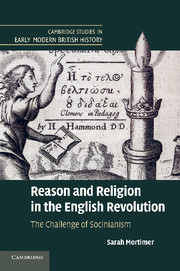Book contents
- Frontmatter
- Contents
- Acknowledgements
- Abbreviations and conventions
- Introduction
- 1 The Socinian challenge to Protestant Christianity
- 2 Socinianism in England and Europe
- 3 The Great Tew Circle: Socinianism and scholarship
- 4 Royalists, Socinianism and the English Civil War
- 5 Socinianism and the Church of England
- 6 Reason, religion and the doctrine of the Trinity
- 7 Anti-Trinitarianism, Socinianism and the limits of toleration
- 8 Socinianism and the Cromwellian Church settlement
- Conclusion: the legacy of Socinianism
- Bibliography
- Index
8 - Socinianism and the Cromwellian Church settlement
Published online by Cambridge University Press: 05 May 2010
- Frontmatter
- Contents
- Acknowledgements
- Abbreviations and conventions
- Introduction
- 1 The Socinian challenge to Protestant Christianity
- 2 Socinianism in England and Europe
- 3 The Great Tew Circle: Socinianism and scholarship
- 4 Royalists, Socinianism and the English Civil War
- 5 Socinianism and the Church of England
- 6 Reason, religion and the doctrine of the Trinity
- 7 Anti-Trinitarianism, Socinianism and the limits of toleration
- 8 Socinianism and the Cromwellian Church settlement
- Conclusion: the legacy of Socinianism
- Bibliography
- Index
Summary
In 1652, John Owen and his fellow Independent ministers had assumed that Socinian ideas found little support in England, yet by 1655 they feared that this Polish heresy was infiltrating England, rivalling the appeal of true Reformed theology. The Independents recognised that the Socinians offered a new approach to the scriptural text, which supported a new interpretation of Christianity, and they realised that this alternative reading could seriously damage their plans for a Church settlement. At the same time, however, they believed that by demonstrating the errors and absurdities of the Socinians they could prove the superiority of their own version of Christianity. Whereas in 1652 they had used a petition against the Racovian Catechism to bolster support for a Trinitarian settlement, by the middle of the 1650s they were more ambitious, hoping to discredit several theological positions at once by associating them with Socinianism. Yet Owen and his friends also became genuinely anxious about the spread of Socinian ideas – and there was some truth in their fears. There is evidence from this period for positive engagement with Socinian ideas, but most especially with Socinian ideas as they were mediated through the Remonstrant tradition. The result was a clash between different views of what constituted a ‘reasonable’ reading of Scripture – a clash that damaged the prospects for Church settlement in the short term, but which also revealed some serious tensions within English Reformed theology and intellectual culture.
- Type
- Chapter
- Information
- Reason and Religion in the English RevolutionThe Challenge of Socinianism, pp. 205 - 232Publisher: Cambridge University PressPrint publication year: 2010

